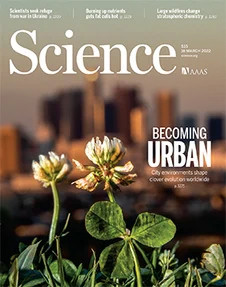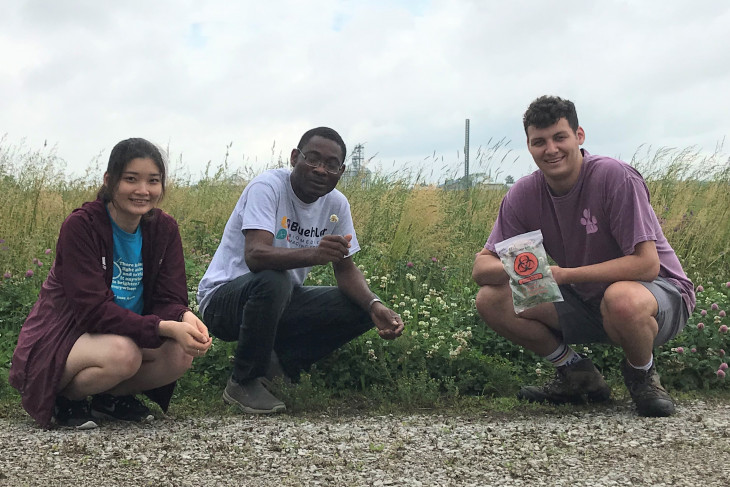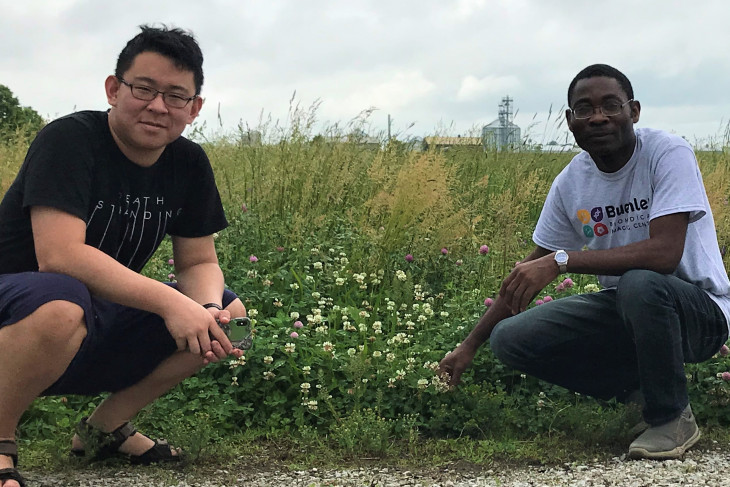A DePauw University biology professor is a co-author of the cover story in last week’s issue of Science, a leading publication about scientific discovery.
Philips Akinwole, assistant biology professor and a microbial ecologist, was among 278 scientists who gathered 110,019 samples of white clover from 6,169 populations in 160 cities across the world, analyzed them and wrote about findings for “Global urban environmental change drives adaptation in white clover,” the cover story for the March 18 issue (subscription required).
 Akinwole enlisted the help of seven DePauw students to support his work.
Akinwole enlisted the help of seven DePauw students to support his work.
“Getting published in Science magazine is a tremendous accomplishment that only few scientists achieve in their careers,” said professor Henning Schneider, chair of the Biology Department.
Before arriving at DePauw, Akinwole became involved with the Global Urban Evolution Project through collaborators at University of Toronto Mississauga and collected clover samples in Sioux Falls, South Dakota.
When he started work at DePauw in fall 2018 as a postdoctoral student – he became an assistant professor last year – he enlisted five biology students, over two semesters and a summer, to help him collect samples in 10 Midwestern cities, including Indianapolis, and give the students “hands-on and impactful research experience,” he said. Two more students later worked in the lab on frozen samples.
Two of the students – Seika Shiba ’21 and Yangjie Tan ’22 – won an award for their presentation about the project at the Sigma Xi conference in 2019.

(l to r) Seika Shiba ’21, Akinwole and Victor Alfonso ’20

Yangjie Tan ’22 and Akinwole
Akinwole and his counterparts around the world measured how much hydrogen cyanide white clover in urban areas created as a natural defense against plant-eating animals compared to white clover found in rural areas. The results demonstrated “that urbanization leads to adaptation on a global scale,” the article said.
“Our results have general implications for understanding how environmental change affects adaptation in widespread species. … Urbanization is increasingly transforming rural and natural environments into unique ecosystems that Earth’s biodiversity has never experienced, and these changes are altering the evolution of life. If adaptation to urban environments is common, then this could have cascading effects on populations and ecosystems.”
Such knowledge, the article went on to say, could help conserve some of Earth’s most vulnerable species, mitigate the impacts of pests, improve human well-being and contribute to understanding fundamental eco-evolutionary processes.
“This is a big deal,” said Akinwole’s colleague Dana Dudle, Winona H. Welch professor of biology and associate chair of the Biology Department. “Science is one of the top scientific journals in the world, and thousands and thousands of people will see this work.”
Science magazine, founded in 1880 with seed money from Thomas Edison, publishes research and is part of a family of journals published by the American Association for the Advancement of Science.
Browse other stories
-
Athletics
-
Women's Tennis - DePauw Advances to NCAC Semifinals with 4-0 Win over Wooster
-
Baseball - DePauw Tops Rose-Hulman in Home Finale
-
Men's Lacrosse - Tigers Fall to Wittenberg
More Athletics
-
-
News
-
Little 5 makes big splash through philanthropy and service
-
Greencastle Celebrates National Main Street Day with Small Business Breakfast, New Program Launch, and Spring Pitch Competition
-
Hirotsugu "Chuck" Iikubo ’57 remembered as thoughtful leader, advocate for international goodwill
More News
-
-
People & Profiles
-
11 alums make list of influential Hoosiers
-
DePauw welcomes Dr. Manal Shalaby as Fulbright Scholar-in-Residence
-
DePauw Names New Vice President for Communications and Strategy and Chief of Staff
More People & Profiles
-
-
Have a story idea?
Whether we are writing about the intellectual challenge of our classrooms, a campus life that builds leadership, incredible faculty achievements or the seemingly endless stories of alumni success, we think DePauw has some fun stories to tell.
-
Communications & Marketing
101 E. Seminary St.
Greencastle, IN, 46135-0037
communicate@depauw.eduNews and Media
-
News media: For help with a story, contact:
Bob Weaver, Senior Director of Communications.
bobweaver@depauw.edu.